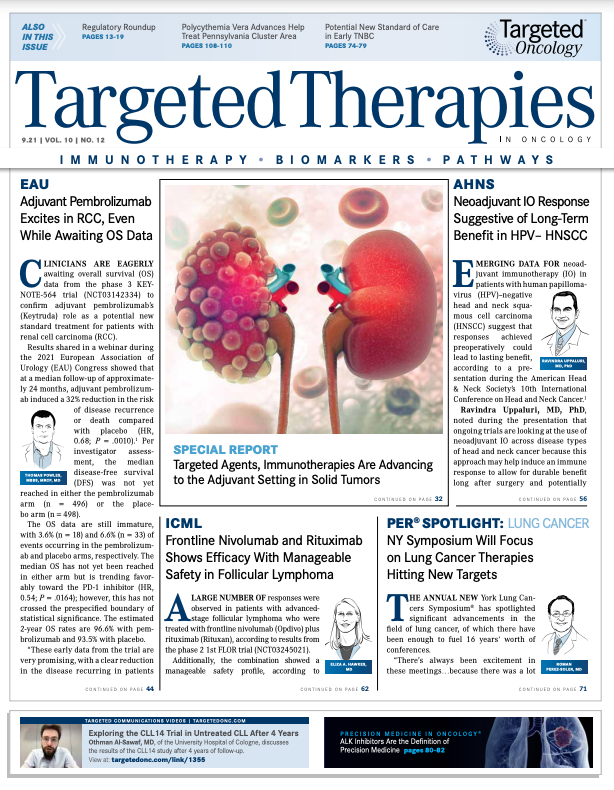Adjuvant Pembrolizumab Excites in RCC, Even While Awaiting OS Data
Results shared in a webinar during the 2021 European Association of Urology Congress show the potential of adjuvant pembrolizumab for the treatment of renal cell carcinoma.
Thomas Powles, MBBS, MRCP, MD

Clinicians are eagerly awaiting overall survival (OS) data from the phase 3 KEYNOTE-564 trial (NCT03142334) to confirm adjuvant pembrolizumab’s (Keytruda) role as a potential new standard treatment for patients with renal cell carcinoma (RCC).
Results shared in a webinar during the 2021 European Association of Urology (EAU) Congress showed that at a median follow-up of approximately 24 months, adjuvant pembrolizumab induced a 32% reduction in the risk of disease recurrence or death compared with placebo (HR, 0.68; P = .0010).1 Per investigator assessment, the median disease-free survival (DFS) was not yet reached in either the pembrolizumab arm (n = 496) or the placebo arm (n = 498).
The OS data are still immature, with 3.6% (n = 18) and 6.6% (n = 33) of events occurring in the pembrolizumab and placebo arms, respectively. The median OS has not yet been reached in either arm but is trending favorably toward the PD-1 inhibitor (HR, 0.54; P = .0164); however, this has not crossed the prespecified boundary of statistical significance. The estimated 2-year OS rates are 96.6% with pembrolizumab and 93.5% with placebo.
“These early data from the trial are very promising, with a clear reduction in the disease recurring in patients on pembrolizumab. There are signs as well that the drug may improve survival rates, but we can’t be sure of that for another few years. We’re hopeful that this trial, when complete, will provide a strong case for this drug to be approved for use by the medicines regulator,” said coinvestigator Thomas Powles, MBBS, MRCP, MD, in a press release.2 Powles is a professor of genitourinary oncology and group lead for solid tumor research at Barts Cancer Institute, and director of the Barts Cancer Centre in London, United Kingdom.
The standard-of-care treatment for patients with locoregional RCC is surgery; however, nearly half of patients eventually experience disease recurrence. Currently, no standard adjuvant systemic therapy exists that is supported by high levels of evidence worldwide.
In the double-blind, multicenter KEYNOTE-564 study, investigators explored pembrolizumab vs placebo following nephrectomy in patients with clear cell RCC. Specifically, patients’ disease had to meet criteria that categorized them as high risk for recurrence, which included: pT2, grade 4 or sarcomatoid, N0, M0; pT3, any grade, N0, M0; pT4, any grade, N0, M0; any pT, any grade, N-positive, M0; or M1 with no evidence of disease after surgery.
Patients had to have undergone nephrectomy within 12 weeks prior to randomization, could not have previously received systemic treatment, and had to have an ECOG performance status of 0 or 1. In addition, a tissue sample had to have been obtainable for PD-L1 assessment.
All patients were randomized 1:1 to receive pembrolizumab at 200 mg every 3 weeks or placebo every 3 weeks, both for approximately 1 year.
At 1 year, the estimated DFS rates were 85.7% with pembrolizumab and 76.2% with placebo. At 2 years, these rates were 77.3% and 68.1%, respectively.
Regarding safety, all-grade adverse events (AEs) with pembrolizumab occurred in 96.3% of patients and in 91.1% of those receiving placebo; grade 3 to 5 AEs occurred in 32.4% and 17.7%, respectively. AEs led to death in 2 patients treated with pembrolizumab and in 1 patient receiving placebo.
REFERENCES:
1. Powles T. Pembrolizumab (pembro) vs. placebo as post nephrectomy adjuvant therapy for patients (pts) with renal cell carcinoma (RCC): randomized, double-blind, phase 3 KEYNOTE-564 study. Presented at: 36th Annual EAU Congress; July 8-12, 2021; Virtual.
2. New use of old drug reduces risk of kidney cancer returning. News release. European Association of Urology. July 10, 2021. Accessed August 17, 2021. https://bit.ly/3ldbQ9A

Enhancing Precision in Immunotherapy: CD8 PET-Avidity in RCC
March 1st 2024In this episode of Emerging Experts, Peter Zang, MD, highlights research on baseline CD8 lymph node avidity with 89-Zr-crefmirlimab for the treatment of patients with metastatic renal cell carcinoma and response to immunotherapy.
Listen
Beyond the First-Line: Economides on Advancing Therapies in RCC
February 1st 2024In our 4th episode of Emerging Experts, Minas P. Economides, MD, unveils the challenges and opportunities for renal cell carcinoma treatment, focusing on the lack of therapies available in the second-line setting.
Listen